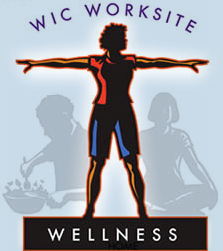|
Unemployment Assistance, Debt Counseling, and Financial Literacy
Although being unemployed is never easy and looking for a job is a job in itself, WIC Can Help by referring families to a multitude of resources that can assist with everything from job training to learning how to get out of debt after lost wages from not working. WIC can provide resources to help families learn about the difference between credit and savings, and knowing who to trust when making financial decisions for themselves or others.
|

Cold vs. Flu?
'Tis the season when we find ourselves asking 'Is it a head cold, or do I need to be more concerned? Could it be the flu?' There are some clear distinctions between the two similar types of viral illness in terms of symptoms - how quickly they appear and how severe they become. If you do have the flu, consult with your health care provider about treatment and do your best not to expose your officemates!
|
Shopping at Amazon?
Support CWA without spending anything extra by using
AmazonSmile!
|
Did someone share this with you? Sign up here to get the CWA Flash directly!
|
|
 |
|

Federal Shutdown Standoff: WIC Is Open
As the government shutdown drags into a third week, Congressional Democrats are resisting the president's demand for wall funding. The House, under Speaker Pelosi, passed two appropriations bills on Thursday, including an Agriculture appropriations bill that passed the Senate unanimously in the last Congress, but Senate Majority Leader McConnell has refused to move forward on these bills without White House approval. With the government shutdown continuing, concerns about WIC funding are growing. States have adequate funding, using reserves, to remain open into February. USDA is working on steps to identify funds for state programs including: allocating remaining carryover and preliminary recovery funds to state programs, making FY2018 NSA spend forward funds available for FY2019, and asking states to identify any unspent funds from FY2018 available as recovery or reallocation funds for use in FY2019. ACTION: NWA has provided talking points for participants, media and organizations. Check their website for legislative updates and social media messages. Use your media channels to share widely that WIC is open!
|

State Updates - Welcome Governor Newsom!
Newly elected California Governor Gavin Newsom was sworn into office on January 7th. In his first official act he signed the first ever executive order to create the largest single purchaser of prescription drugs in the nation that would also allow private employers to join with the state in negotiating drug prices. The Governor will unveil his first state budget later this week, and is expected to propose significant expansions to healthcare access, family leave, affordable childcare, and early childhood education. In his inauguration speech, Governor Newsom said that he also plans to focus upon de-stigmatizing mental health services, keep a robust reserve for economic uncertainties, help out small businesses and help out CA's senior citizens. Among the Governor's new appointments is Tam Ma as the Deputy Legislative Affairs Secretary for Health & Human Services in the Governor's Office. Some of you may recall that Ms. Ma spoke in November at our CWA Policy Education Day and shared with us that she was a beneficiary of the WIC Program growing up. We are so very excited for her and look forward to working with her in her new position!
|
Spring Conference UPDATE! Draft Agenda Posted
Plans are underway for another memorable annual conference April 28-May 1, 2019! Your curriculum planning team has been hard at work and the draft agenda has been posted. You can also find conference registration, hotel reservation information, and sign your team up for Wave Catchers Trivia Night (more information coming soon). Our 27th annual conference will be engaging, exciting, and full of fresh concepts and ideas. Schedule meetings with peers, network with new partners, move and groove with fun physical activities, browse and interact with new products and opportunities at our popular trade show, and leverage this important time together to grow. We can't wait to see you!
|
CNC Scholarship Applications: Deadline Jan. 15!
The California Nutrition Corps (CNC) Scholarship applications are posted. WIC employees also working toward a bachelors or advanced degree in nutrition, public health or related field, or their dietetic internship are invited to apply. Applications are due Jan. 15, 2019 and awards will be announced Mar. 15, 2019.
|
WIC Leadership Academy 2018 AND 2019 - Deadline Jan. 18!
The 2018 Leadership Class will have one more meeting on Jan. 29 at the CWA office. Applications for Leadership 2019 are now posted and applications are due Jan. 18. Local agency directors and staff AND state staff are welcomed to apply. Take advantage of this opportunity to grow! Questions? Ask Lena!
|

Farming Doesn't Match Recommendations
Comparing agricultural production of the major food groups with the recommended daily servings, reveals some excesses and shortages. Using the Harvard Healthy Eating Plate Guide, fruit and vegetable production would need to greatly increase, as would a moderate amount of protein, while production of grains, sugars and fats could need to decrease. The good news is fruit and vegetable production uses less land than grain, fat or sugar. The shift in protein would require more consumption of plant protein, rather that meat protein.
|

Coconut Oil Enjoys a "Health Halo" - but Science Doesn't Back it Up
A recent survey found that 72 percent of Americans say coconut oil is a "healthy food," and claims have been made of its ability to blast belly fat and raise your good cholesterol. Nutritionists note, however, that coconut oil contains a lot of saturated fat - the kind that is a big risk factor for heart disease, which kills more than 17 million people a year worldwide. While fat is an important part of our diets, what kind of fat we eat and how much matters. The U.S. government recommends keeping saturated fat below around 22 grams a day, and the American Heart Association's recommendation is much lower - more like 13 grams. One tablespoon of coconut oil has 12 grams of saturated fat. A recent American Heart Association advisory examined studies that showed replacing saturated fats found in foods like tropical oils and meat with unsaturated fats like those in olive oil, canola oil and flaxseed oil was linked with a 30 percent reduction in the risk of cardiovascular disease. Experts say that using coconut oil in your cooking occasionally is fine, but remember to use saturated fats in moderation, and remember that there's more evidence to support using other plant-based oils, such as olive oil.
|
Routes to Success for Medicaid Coverage of Doula Care
Maternal mortality among women of color is a national crisis - black women are three to four times as likely as white women to die during labor and the maternal period. Numerous studies have demonstrated that doulas can help reduce the impacts of racism on pregnant women of color by helping to provide culturally appropriate, patient-centered care. Doula care would seem to be a natural fit for underserved populations such as women of color, immigrant women, and low-income women, who experience among the worst maternal health and birth outcomes. Private insurance rarely covers doula care, and presently only two states, Minnesota and Oregon, provide doula care for their Medicaid enrollees. The California Preterm Birth Initiative has partnered with National Health Law Program on an issue brief which lays out barriers to Medicaid coverage for doula care as well as proposes potential recommendations for successful implementation.
|
MCAH Video Series
A collection of videos - including versions specifically intended for use in WIC waiting rooms - from the CDPH Center for Family Health, Maternal, Child and Adolescent Health Division, is available to be downloaded and used for public education and outreach to potential participants, stakeholders, social media followers and others interested in these programs. When you click to go to a video series, you will find download instructions plus a brief synopsis of each story. HomeStory, AFLP and SisterStory offer two download options to fit your needs.
|
Report on Discrimination Against Breastfeeding Workers
The Center for WorkLife Law has released a report titled "Exposed: Discrimination Against Breastfeeding Workers." The report exposes the devastating consequences of breastfeeding discrimination, including job loss, negative health outcomes, sexual harassment, and weaning earlier than doctors recommend. According to the study, 27.6 million women of childbearing age do not have the basic protections needed by all breastfeeding workers. The report features the stories of breastfeeding women who struggled with a lack of accommodations, hostility, and retaliation, including an NYPD police officer, an emergency room nurse, a kindergarten teacher, and a U.S. Air Force Airman. It also offers the seven components of a model policy states can enact to ensure breastfeeding workers are able to earn a living for their families without jeopardizing their health. The report was released alongside an interactive map of state laws that impact breastfeeding workers and a shareable video.
|
Strengthen Your Advocacy in 2019!
Thinking about ways to grow as a community member or professional in the new year? Is your organization using best practices to advocate for its mission? Bolder Advocacy, an initiative of Alliance for Justice can provide individual coaching, webinars, and resources for individuals or organizations to ensure that non-profits can advocate for their mission and participate in our democracy. Here are upcoming training events.
|
Addressing Substance Use Among Women, Infants, and Families
The Association of State and Territorial Health Officials has released a report titled "The Role of State Health Leaders in Addressing Substance Use Disorders Among Women, Infants, and Families." As states address the rising challenge presented by substance use disorders (SUD) and neonatal abstinence syndrome (NAS), many are beginning to implement strategies that systematically consider the needs of women, infants, and their families, using a public health approach. State health leaders play a critical role in supporting a comprehensive public health approach. This report highlights six public health approaches for addressing the rising incidence of SUD and NAS-and draws out the critical role that state health leaders play in each.
|
|
|